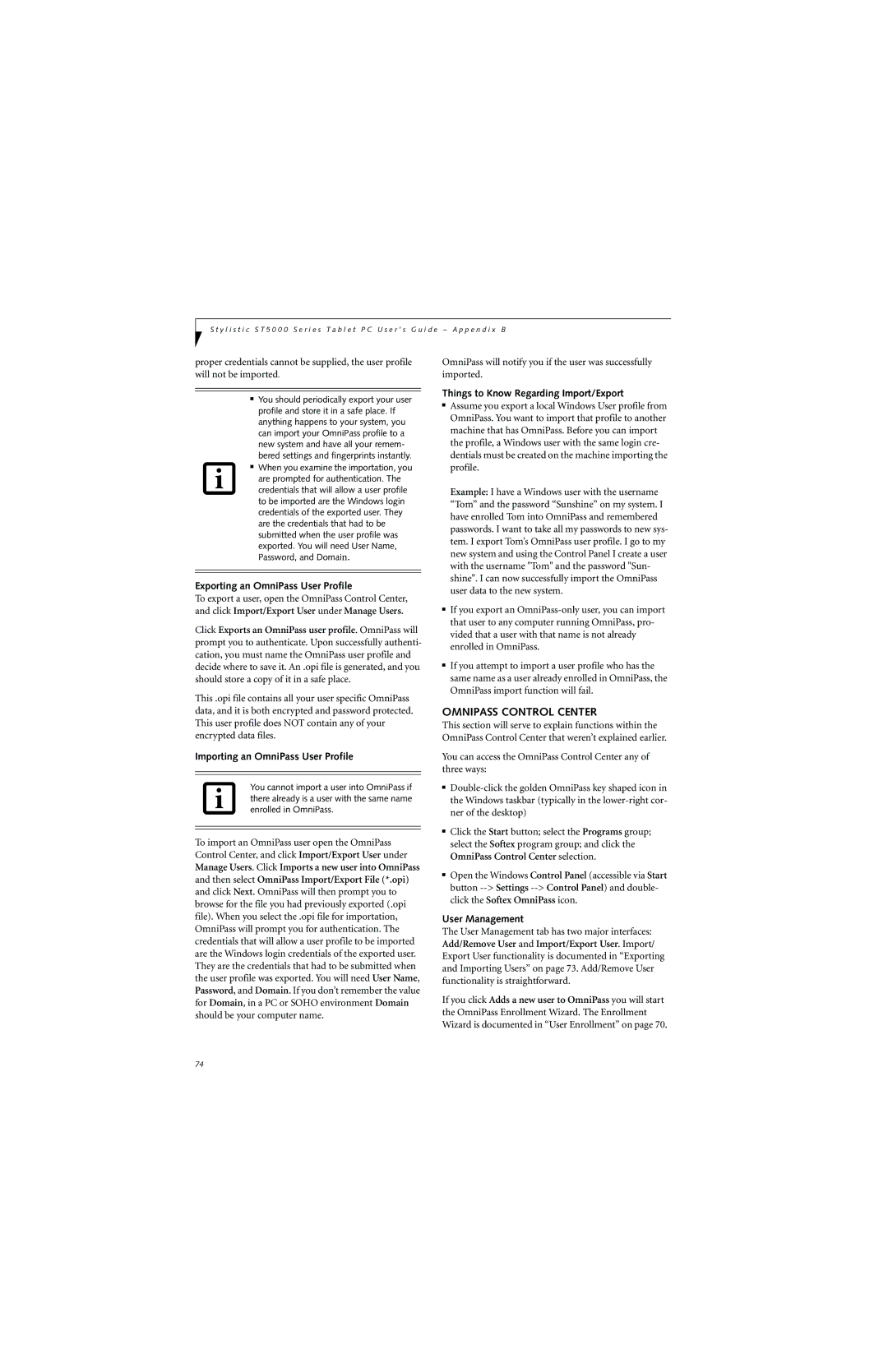
S t y l i s t i c S T 5 0 0 0 S e r i e s T a b l e t P C U s e r ’ s G u i d e – A p p e n d i x B
proper credentials cannot be supplied, the user profile will not be imported.
■You should periodically export your user profile and store it in a safe place. If anything happens to your system, you can import your OmniPass profile to a new system and have all your remem- bered settings and fingerprints instantly.
■When you examine the importation, you are prompted for authentication. The credentials that will allow a user profile to be imported are the Windows login credentials of the exported user. They are the credentials that had to be submitted when the user profile was exported. You will need User Name, Password, and Domain.
Exporting an OmniPass User Profile
To export a user, open the OmniPass Control Center, and click Import/Export User under Manage Users.
Click Exports an OmniPass user profile. OmniPass will prompt you to authenticate. Upon successfully authenti- cation, you must name the OmniPass user profile and decide where to save it. An .opi file is generated, and you should store a copy of it in a safe place.
This .opi file contains all your user specific OmniPass data, and it is both encrypted and password protected. This user profile does NOT contain any of your encrypted data files.
Importing an OmniPass User Profile
You cannot import a user into OmniPass if there already is a user with the same name enrolled in OmniPass.
To import an OmniPass user open the OmniPass Control Center, and click Import/Export User under Manage Users. Click Imports a new user into OmniPass and then select OmniPass Import/Export File (*.opi) and click Next. OmniPass will then prompt you to browse for the file you had previously exported (.opi file). When you select the .opi file for importation, OmniPass will prompt you for authentication. The credentials that will allow a user profile to be imported are the Windows login credentials of the exported user. They are the credentials that had to be submitted when the user profile was exported. You will need User Name, Password, and Domain. If you don’t remember the value for Domain, in a PC or SOHO environment Domain should be your computer name.
OmniPass will notify you if the user was successfully imported.
Things to Know Regarding Import/Export
■Assume you export a local Windows User profile from OmniPass. You want to import that profile to another machine that has OmniPass. Before you can import the profile, a Windows user with the same login cre- dentials must be created on the machine importing the profile.
Example: I have a Windows user with the username “Tom” and the password “Sunshine” on my system. I have enrolled Tom into OmniPass and remembered passwords. I want to take all my passwords to new sys- tem. I export Tom’s OmniPass user profile. I go to my new system and using the Control Panel I create a user with the username "Tom" and the password "Sun- shine". I can now successfully import the OmniPass user data to the new system.
■If you export an
■If you attempt to import a user profile who has the same name as a user already enrolled in OmniPass, the OmniPass import function will fail.
OMNIPASS CONTROL CENTER
This section will serve to explain functions within the OmniPass Control Center that weren’t explained earlier.
You can access the OmniPass Control Center any of three ways:
■
■Click the Start button; select the Programs group; select the Softex program group; and click the OmniPass Control Center selection.
■Open the Windows Control Panel (accessible via Start button
User Management
The User Management tab has two major interfaces: Add/Remove User and Import/Export User. Import/ Export User functionality is documented in “Exporting and Importing Users” on page 73. Add/Remove User functionality is straightforward.
If you click Adds a new user to OmniPass you will start the OmniPass Enrollment Wizard. The Enrollment Wizard is documented in “User Enrollment” on page 70.
74
